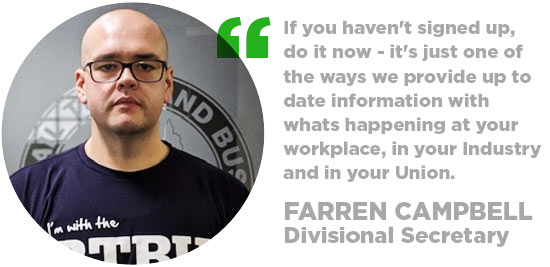Permanent Casuals: A Contradiction in Terms!
Dear members, below is an update from Jim Stanford on the recent activities at the Centre for Future Work.
Permanent Casuals: A Contradiction in Terms!
Recent legal decisions are starting to challenge the right of employers to deploy workers in “casual” positions on a long-term basis. For example, the Federal Court recently ruled that a labour-hire driver who worked regular shifts for years was still entitled to annual leave, even though he was supposedly hired as a “casual.” This decision has alarmed business lobbyists who reject any limit on their ability to deploy casual labour, while avoiding traditional entitlements and protections (like sick pay, annual leave, severance rights, and more). For them, a “casual worker” is anyone who they deem to be casual; but that open door obviously violates the intent of Australia’s rules regarding casual loading. Business lobbyists have confirmed that most casual workers work regular schedules – and have even proposed a new category of “perma-flexi” workers, who could be permanently assigned to casual positions. They are now pressing the Coalition government hard for legislative changes that would cement their right to “permanent casual” hiring – seemingly oblivious to the glaring contradiction of that very idea.
These contradictions are explored in a commentary from Jim Stanford, Director of the Centre for Future Work, discussing the implications of these decisions for the mis-use of casual work. The commentary was originally published on the Ten Daily website.
The Importance of Small Victories
Two other federal bodies have also recently helped to push the envelope on issues of fair work. First, the Fair Work Commission recently strengthened the right of workers in most parts of the economy to request flexibility in their work schedules, to deal with caring responsibilities at home. The decision arose from an ACTU submission to the four-yearly review of Modern Awards. Employers now must respond to these requests seriously, and provide written reasons for rejection of such requests; experience from other jurisdictions (such as the U.K.) confirms that this “strong right to request” makes a meaningful difference in workers’ ability to attain a better work-life balance. The Centre for Future Work contributed to the FWC process with an expert submission marshalling the economic evidence in favour of family-friendly flexibility and scheduling practices. That submission was prepared by Director Jim Stanford and researcher Alison Pennington (who has since joined the Centre’s staff full-time as an Economist). See the Centre’s submission here, and the Commission’s full decision here.
Another example of the influence of the Centre’s research is the recent report of parliament’s Joint Standing Committee on the NDIS, into the “Market Readiness” of the new program. Among the Committee’s 29 recommendations is one proposing expanded access to funded training opportunities for NDIS workers, mentioning specifically the idea of a portable training entitlement. See Recommendation #11 in the full report, posted here. The idea of a portable training entitlement system for NDIS workers was developed by our Centre in conjunction with the NSW-ACT branch of the Australian Services Union. It would provide NDIS workers in all workplaces (large agencies, small firms, and even sole contractors) with one hour of paid training for each 50 hours of NDIS-compensated work. See our full report, written by Dr. Rose Ryan and Jim Stanford. Congratulations to the ASU for their marvelous education and lobbying work promoting this initiative, which would make a very positive contribution to ensuring high-quality jobs, and high-quality service delivery, through the NDIS.
These are just two examples of the ways in which the combination of solid research and determined advocacy can pave the way for incremental but important change in Australia’s labour market.
Some Royal Commissions are More Important than Others
Australians have been transfixed by the shocking revelations at the Royal Commission into Misconduct in the Banking, Superannuation and Financial Services Industry. Hundreds of specific stories of misconduct, including misleading marketing and high-pressure sales tactics, and a wide-ranging failure of regulatory oversight, have led to growing pressure for reforms. The current Commonwealth government initially rejected the very idea of this Royal Commission – so its appetite for legislating subsequent policy changes to address these scandals is certainly in doubt. In contrast, this same government was very enthusiastic in launching the Royal Commission into trade unions as one of its first acts – and it has been relentless in proposing new laws and regulations to police and control union activity in the years since (including recent efforts, defeated in the Senate, to curtail union participation in industry super funds and benefit programs).
Which of these “problems” is most important in the eyes of Australians: banks or unions? Our colleagues at the Australia Institute asked the public. The Institute recently published polling results regarding Australians’ views of recent Royal Commissions: including on banking, unions, child sexual abuse, and the Murray-Darling river basin. The results confirm that while the Royal Commission on Banking is seen to be genuinely promoting public interest goals, many more viewed the trade union Royal Commission as an ideological exercise aimed at damaging the government’s opponents. And by a margin of 70% to 11% (almost 7 to 1), Australians see the banking commission as having uncovered more wrong-doing than the union commission. A full breakdown of the polling results is available here. These results reinforce the conclusion that the trade union commission was intended from the outset to damage the legitimacy of unions generally, not to address “governance” issues; they also confirm that most Australians recognised the government’s true goals.
The Future of Transportation Work: WA Transport Special Series
Earlier this year the Centre for Future Work completed a comprehensive review of factors influencing the future of work in transportation industries, commissioned by TWUSUPER (the industry super fund for transportation). The report (co-authored by Jim Stanford and Matt Grudnoff) concluded that technology is not the only factor transforming work in transportation; if anything, accelerating changes in the nature of employment relationships (including the spread of independent contractor roles, “gigs”, and other forms of insecure work) are having a bigger immediate impact on jobs. Moreover, with appropriate planning, consultation, negotiation, and investments in training and adjustment, the employment impacts of new technology could clearly be managed without undue harm or displacement – but only if all stakeholders commit to an inclusive, collaborative process of planning and adjustment.
In the wake of our report, the industry journal WA Transport has published a very readable compendium of short articles, each exploring a different aspect of our report. With the kind permission of WA Transport, we have reprinted the whole set of articles on our website. Together they are a useful resource for leaders and educators in the transportation industry.
Upcoming Events
The Centre for Future Research is pleased to be participating in the following events. Follow the links for more details:
Wednesday 17 October: Australia Institute’s “Revenue Summit,” featuring Bernie Fraser, Patricia Apps, and others: on the need to strengthen the fiscal base for Australian public programs, Canberra.
Tuesday 23 October: “From Beijing to Rio,” with the Australia Institute’s Richard Denniss and Hugh McDermott, NSW Opposition’s Wastewatch Committee: on sustainable economic development strategies for NSW, Sydney.
Thursday 15 November: Awarding of the Sydney Peace Prize to Nobel-winning economist Joseph Stiglitz, sponsored by the Sydney Peace Foundation, and co-sponsored by the Australia Institute, Sydney.




